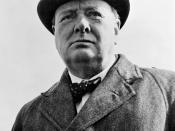Orwell's '1984' and Atwood's 'The Handmaid's Tale' are both novels that can easily be seen to be set in dystopian societies, Oceania and Gilead, in which the individuals are suppressed and relationships are carefully kept under control. The similarities between the two novels are visibly apparent and will be discussed. It could be said that the writers have created dystopian societies to protest against political movements in their own society or own world. They can be seen as a warning to future generations, showing how 'higher powers', such as Big Brother in 'Nineteen Eighty-Four', could attempt to control its citizens. However, as with all suppressive states both novels touch heavily on the subject of the natural instinct of mankind to express free will and some level of independence.
The novels were written in completely different times. Orwell wrote 'Nineteen Eighty-Four' during the cold war period, completing the novel in 1948.
He clearly warns of the dangers of a totalitarian state, which could be seen reflected in Russian and East German societies at the time of Orwell's writing. Many utopian novels can be seen as political tools to help raise awareness of a certain problem the author believes to be apparent, or may become apparent in the not-to-distant future. Both Atwood's 'The Handmaid's Tale' and Orwell's 'Nineteen Eighty-Four' fit into this category. Atwood's 'The Handmaid's Tale', reacts against religious fundamentalism and sexist views; Atwood grew up in a very feminist society with abortion being legalised and more women's rights. However, while the western world was giving women equal rights, the Islamic world was becoming more oppressive; hence Atwood believed a warning tool was needed. The novel could be said to be an act of rebellion in itself against these societies. Each novel equally focuses on the individual, as the protagonist's story...


